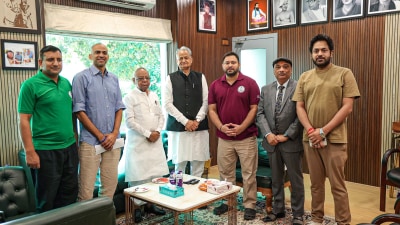There is preliminary consensus in the country’s top technical advisory body on Covid-19 vaccination that the third — booster — dose, when administered, should be of a vaccine based on a platform different from that of the first two doses, The Indian Express has learnt.
The final decision on recommending a booster shot—being given by several countries to shore up waning vaccine-induced immunity from infection with the coronavirus — is yet to be taken.

Senior government sources told The Indian Express that the National Technical Advisory Group on Immunisation (NTAGI) — the apex body that provides vaccination guidance to the government after technical review of the scientific evidence on immunisation policy and programmes — is still assessing the requirement for boosters.
Story continues below this ad
However, there is agreement within the body that the third dose for a beneficiary who has taken an inactivated-whole virus or adenoviral vector vaccine, should be of a vaccine based on a different platform, the sources said.
Bharat Biotech’s Covaxin is an inactivated virus vaccine, while Serum Institute’s Covishield (Oxford-AstraZeneca) and the Russian-made Sputnik V are adenovirus-based vaccines.
“There is some clarity that if an additional dose is given to a beneficiary, it cannot be, at least in the case of inactive whole virus or adenovirus vector Covid-19 vaccines, the same vaccine. So the preliminary consensus is that a beneficiary cannot take three doses of Covishield or Covaxin,” a senior official said.
Sources said this also means that the third dose for an individual who has been double vaccinated with Covishield cannot be Covaxin, and vice versa. The same would apply to Sputnik V as well.
Story continues below this ad
‘Viral vector’ vaccines such as Covishield and Sputnik use a modified version of a virus different from the one being targeted to deliver instructions to the recipient’s cells. The altering of the virus ensures it cannot replicate, and the vaccine cannot make the recipient sick.
Covaxin uses an inactivated or ‘dead’ virus that is incapable of infecting anyone, but can still instruct the immune system to make antibodies against an infection.
The sources underlined, however, that NTAGI is yet to make a formal recommendation to the government, because it is still examining the primary question of administering booster doses.
If and when the recommendation for a booster is made and accepted, eligible beneficiaries vaccinated with Covishield, Covaxin, or Sputnik will likely have multiple options in the coming months.
Story continues below this ad
- There will be Hyderabad-based Biological E’s Corbevax, a Covid-19 vaccine built on the protein sub-unit platform, which differs from inactivated whole-cell vaccines because it uses only the antigenic parts of the virus to trigger a protective immune response.
- The Centre has reserved 30 crore doses of Corbevax against an advance payment of Rs 1,500 crore to the company, and the candidate is expected to get emergency use authorisation in the next two weeks.
- A second candidate for a possible third dose would be Serum Institute of India’s Covovax, a recombinant nanoparticle protein-based vaccine. US-based Novavax, which has developed the vaccine, and SII have already received EUA in the Philippines.
- Bharat Biotech’s intranasal vaccine could be another potential third-dose candidate. Sources said this vaccine, which will be administered through the nasal route and will not use a needle, could be announced in the second half of January.
- A fourth candidate could be India’s first mRNA Covid-19 vaccine, developed by Pune-based Gennova Biopharmaceuticals Ltd. The government has said Gennova is expected to produce 6 crore doses of the vaccine. Unlike the mRNA vaccines developed by Pfizer and Moderna, this vaccine will not require ultra-cold storage, and can be stored at 2-8 degrees Celsius.
Several experts bodies around the world have recommended mRNA vaccines as booster doses. In September, after reviewing data on booster responses from different combinations of Covid-19 vaccines, the UK’s expert body advised that Pfizer’s mRNA vaccine should be given as the booster, irrespective of which product had been used in the primary schedule (first two doses).
Explained: What this means for you
If you have taken Covishield, Covaxin, or Sputnik, your third shot cannot be any of these. Options could be Corbevax, Covovax, the intranasal vaccine, or India’s first mRNA shot, all of which are expected to be authorised in the coming weeks and months.









